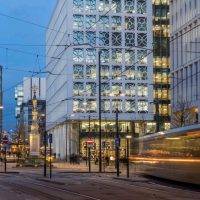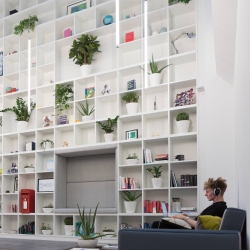To provide the best experiences, we use technologies like cookies to store and/or access device information. Consenting to these technologies will allow us to process data such as browsing behaviour or unique IDs on this site. Not consenting or withdrawing consent, may adversely affect certain features and functions.
The technical storage or access is strictly necessary for the legitimate purpose of enabling the use of a specific service explicitly requested by the subscriber or user, or for the sole purpose of carrying out the transmission of a communication over an electronic communications network.
The technical storage or access is necessary for the legitimate purpose of storing preferences that are not requested by the subscriber or user.
The technical storage or access that is used exclusively for statistical purposes.
The technical storage or access that is used exclusively for anonymous statistical purposes. Without a subpoena, voluntary compliance on the part of your Internet Service Provider, or additional records from a third party, information stored or retrieved for this purpose alone cannot usually be used to identify you.
The technical storage or access is required to create user profiles to send advertising, or to track the user on a website or across several websites for similar marketing purposes.
 New World Health Organization (WHO) Global Air Quality Guidelines (AQGs) claim to provide clear evidence of the damage air pollution inflicts on human health, at even lower concentrations than previously understood. The guidelines recommend new air quality levels to protect the health of populations, by reducing levels of key air pollutants, some of which also contribute to climate change. (more…)
New World Health Organization (WHO) Global Air Quality Guidelines (AQGs) claim to provide clear evidence of the damage air pollution inflicts on human health, at even lower concentrations than previously understood. The guidelines recommend new air quality levels to protect the health of populations, by reducing levels of key air pollutants, some of which also contribute to climate change. (more…)






 Hybrid working could bring nearly four million people “locked out” from work such as parents, carers and disabled people into the workforce and enable part-time workers to work more hours adding £48.3bn to the UK economy each year, according to a new study by
Hybrid working could bring nearly four million people “locked out” from work such as parents, carers and disabled people into the workforce and enable part-time workers to work more hours adding £48.3bn to the UK economy each year, according to a new study by 
 Huge changes in the world of work over the past 30 years have led to people having a greater attachment to their work, but also rising levels of stress and falling levels of control, which has coincided with low earners losing their ‘job satisfaction premium’ over higher paid colleagues, according to new research from think tank the
Huge changes in the world of work over the past 30 years have led to people having a greater attachment to their work, but also rising levels of stress and falling levels of control, which has coincided with low earners losing their ‘job satisfaction premium’ over higher paid colleagues, according to new research from think tank the 
 Scotland is to become the latest nation to trial a
Scotland is to become the latest nation to trial a 
 Today, companies cannot shy away from their responsibilities towards the environment. With Extinction Rebellion keeping the climate crisis firmly on the news agenda, and COP26 in November gathering more international attention than ever, how businesses approach and champion sustainability is under significant scrutiny. At a local level, organisations are being set targets by the UK government to commit to
Today, companies cannot shy away from their responsibilities towards the environment. With Extinction Rebellion keeping the climate crisis firmly on the news agenda, and COP26 in November gathering more international attention than ever, how businesses approach and champion sustainability is under significant scrutiny. At a local level, organisations are being set targets by the UK government to commit to 
 New ways of working will boost UK productivity and increase employment levels in cities outside of London, according to a new report from KPMG. And as businesses in some sectors prepare for employees to spend two to three days a week working from home on a permanent basis, demand for office space could see capacity potentially increase by as much as 40 percent, according to a new KPMG report,
New ways of working will boost UK productivity and increase employment levels in cities outside of London, according to a new report from KPMG. And as businesses in some sectors prepare for employees to spend two to three days a week working from home on a permanent basis, demand for office space could see capacity potentially increase by as much as 40 percent, according to a new KPMG report, 
 I recently stumbled upon the phrase epistemic trespass, which describes the phenomenon of people making judgements in fields in which they have no expertise. I came across it as it was used to explain the sudden explosion of opinions about Afghanistan from a hitherto unknown horde of experts. Which may or may not be the same horde that has been so very certain about immunology and public health during the pandemic. It’s an old idea and one that needs to be treated with care, for reasons set out by Noah Smith
I recently stumbled upon the phrase epistemic trespass, which describes the phenomenon of people making judgements in fields in which they have no expertise. I came across it as it was used to explain the sudden explosion of opinions about Afghanistan from a hitherto unknown horde of experts. Which may or may not be the same horde that has been so very certain about immunology and public health during the pandemic. It’s an old idea and one that needs to be treated with care, for reasons set out by Noah Smith 
 CEOs of the world’s largest businesses are increasingly optimistic about the outlook for their own business, according to the latest
CEOs of the world’s largest businesses are increasingly optimistic about the outlook for their own business, according to the latest 
 The
The 
 Social enterprises tackle large-scale social problems by attracting resources and legitimacy from businesses – but social enterprises and businesses have two often contradictory aims; market success and social impact.
Social enterprises tackle large-scale social problems by attracting resources and legitimacy from businesses – but social enterprises and businesses have two often contradictory aims; market success and social impact. 
 The Aeron Chair Portfolio, including new colourway Onyx Ultra Matte, and other product and packaging solutions will incorporate mismanaged plastic waste found near waterways as part of the company’s commitment to use 50 percent recycled content in all materials by 2030.
The Aeron Chair Portfolio, including new colourway Onyx Ultra Matte, and other product and packaging solutions will incorporate mismanaged plastic waste found near waterways as part of the company’s commitment to use 50 percent recycled content in all materials by 2030. 








September 21, 2021
The commercial property market is changing rapidly, and for the better
by Tom Jansons • Comment, Property